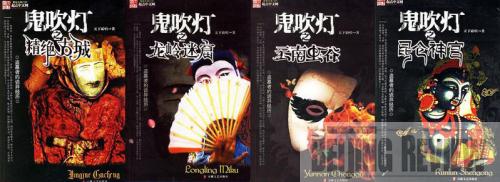|
 |
|
Tomb Raiders (Guichuideng), a four-volume fictional work written by Zhang Muye |
Coiling Dragon, a novel about a legendary dragon-descendant warrior seeking revenge for his parents' murder, is now a smash hit among Chinese online readers. It has received more than 70 million hits at Qidian.com, a Web portal dedicated to original literature online, and nearly 20 million at Baidu.com.
Hou Xiaoqiang, CEO of SNDA Literature Co. Ltd. under the Shanghai-based Nasdaq-listed entertainment giant SNDA Group, released the two figures in his lecture at SMG Oriental College of Mass Media in early July. He estimated that this increasingly popular novel would eventually bring in 200 million yuan ($28.57 million) for its author and Qidian.com.
Online literature has shown enormous potential commercial value.
"Web-published novels are leading an increasing number of people to dig deep in their pockets," Hou said. At Qidian.com, reading the first half of a novel is free and the rest costs 0.03 yuan ($0.004) per 1,000 words; the Web portal and the author share the revenue 50-50 or 30-70. In 2008, Qidian.com's top-earning writer reaped 4 million yuan ($571,430) and more than 100 others made 100,000 yuan ($14,286).
Much more handsome profit will be made with the rapidly growing number of people reading novels on cellular phones. Having witnessed skyrocketing daily revenue from the online literature business at his company, from 2,000 yuan ($285) in the early days to 50,000 yuan ($7,143) this year, Hou anticipates a staggering 300,000 yuan ($42,860) in daily income next year.
But the commercial value of Web literature is not limited to providing online material. Koizora, a non-fiction work published on mobile phones in Japan, is a good example. It registered a total of 26.72 million hits online and sold 1 million copies within 30 days after it was published as a book. The movie adaptation earned more than 4 billion yen ($43 million) at the box office in two months.
SNDA Group, where Hou works, has been exploring the same path by developing online literature derivative products and selling the copyrights of Web novels to movie and TV producers.
After Qidian.com sold the adaptation rights for Tomb Raiders (Guichuideng) to Taiwan-based Skyfilm Entertainment Co. Ltd. in 2007, SNDA Games purchased the right to adapt Changing Stars (Xingchenbian) into an online game at a price of 1 million yuan ($142,860) earlier this year.
Like Coiling Dragon, Tomb Raiders and Changing Stars are also grassroots original literary works published online that have fascinated millions of readers across the country. The former is a four-volume fictional work full of thrilling explorations in ancient mausoleums by three field officers tracing the origin of their long-disappeared tribe; and the latter is a serialization depicting the adventurous life of a royal descendant who acquires extraordinary magic and kungfu after a meteoric crystal dissolves into his blood.
All these novels owe their success to new media like the Web and mobile phones. The rapid development of the Internet and telecommunications technologies has enabled numerous novice writers to publish their works using powerful and fast-spreading media and thus earn overnight fame and awesome income.
Many of these writers are actually amateurs from all walks of life. But whether they are college students, grocery store owners or IT engineers, click-through rates on the links to their writings are the most convincing criterion to measure their achievement.
What these famed grassroots writers also have in common is wild imagination with which they created an idealized world that captivates readers.
Hou Xiaoqiang revealed the secret of success--the Web provides fertile soil for the writers' bold imagination to blossom, while people's strong desire for a perfect unreal world offers a huge market for the fruits of imagination.
With the Web literature-related industry flourishing and becoming increasingly lucrative, piracy has become a severe threat to its sound development and caused huge losses to writers and the Web portals that legally publish their works.
According to Hou, if there were no pirated links, at least 10 authors at Qidian.com would earn more than 10 million yuan ($1.43 million) annually. In contrast, the top-earning writer makes 4 million yuan ($571,430). But Hou is still optimistic about the industry's prospects, saying that he believes the Chinese will eventually discard pirated products and the startlingly enormous commercial value of Web literature and its derivatives will then become clear.
(Source: China Business News )
| 